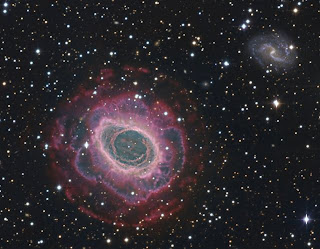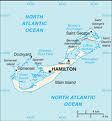
by Gwilym Williams
_____________
A loud bang, a squeal, a clatter, a jangle, a jingle, a short silence, and then an almighty BOOM! And then a protracted silence.
UFO1 lurched drunkenly and plunged towards the centre of Galaxy M22.
Soap bubbles and black smoke swirled up the stairwell. An old man smoking a briar emerged onto the bridge. He was wearing a once-white lab coat now torn to shreds. His soot-stained hair stood on end and from his left hand there dangled the melted remains of a large rubber torch.
"That's torn it," he said mildly to the two men on the bridge.
"Chief Engineer Einstein, what do you mean exactly by 'torn it'?" said Captain Newton from his revolving chair.
"The light speed machine is kaput, sir."
"On our present course we shall rendezvous with the black hole in M22 in precisely 0.333 of a light year," observed Navigator Galilei, gazing through the starboard porthole.
"I don't suppose you can fix the thing?" growled Captain Newton, his chair slowly revolving to a stop.
"Difficult," said Einstein, after a long pause.
"If not impossible," said Galilei.
"Mind you, we can't expect UFO1 to go on forever. She is 20 billion light years old. Mechanical problems are bound to arise," said Newton philosophically.
"It's not as if we have any spare parts," said Einstein ruefully.
"Or any hope of getting any," added Galilei gratuitously.
At that moment Midshipman Hawking arrived with a tray of steaming ersatz coffee.
"Perhaps young Hawking can help us?" mused Newton.
"How, sir?" asked Hawking nervously.
The three officers fell into deep thought. Hawking shuffled and recalled that the crew's toilets, showers and laundry facilities had been wrecked by the blast.
"Hawking," snapped Newton at last, "can you remind us about the speed of light?"
"300,000 kilometres per second," Hawking answered brightly.
"And...," said Netwon, waiting for more.
"And it's constant," added Hawking.
"Why is it constant, Hawking?" demanded Newton.
"Because of the effect of ... UFO1's machine?" Hawking ventured uncertainly.
"A good shot," said Newton.
"Shall I explain?" said the Chief Engineer.
"Please do Mr. Einstein, otherwise we shall be here forever."
"The universe," said Einstein, beginning to pace backwards and forwards, "can only exist because of the effect of the light-speed machine, or the LSM as we shall call it. The LSM works like an old Buster Keaton movie but its rate of flicker is obviously much faster. In fact it flickers at an amazingly high speed. The LSM here on UFO1 is responsible for keeping the speed of light constant throughout the universe."
The Chief Engineer paused to let this top secret piece of information sink in. He struck a match and slowly lighted his briar.
"Well I never. How extremely clever," said Galilei smiling.
"So the universe that you think you see is not really there all of the time," said the Captain.
Hawking gasped.
"You may continue Mr. Einstein."
"Thank you, Captain. Now where was I? Ah yes ... young Hawking ... and you Galilei ... you may both consider that the universe is in effect blinking on and off like an old film but you can't see the gaps. You can only say that the light seems to be coming at you and going away from you at a terrific speed."
"Unless there's a time slip," said Newton, casually swirling the dregs in his coffee mug.
"Time slip," echoed Hawking.
"Yes Midshipman Hawking, a time slip. Just as in those old films the film suddenly jumps a few sprockets, so it can happen in the universe when the LSM computer is having an off-day. There can be a slight disorientation of time in various odd places; there are glimpses into the future and other such phenomena. These are simply the work of the gremlins in the LSM."
Hawking considered this.
"Mr. Einstein," he said after a few moments, "is the LSM totally defunct?"
"I just saw the remains of it sailing past the starboard porthole," said Galilei.
"I guess it is," said Einstein.
There was a long silence as they all considered the implications.
"I'm afraid it's the end," said Newton at last.
"Yes, the whole kit and caboodle is going to go up in smoke pretty soon," said Einstein, drawing deeply on his briar.
"I concur," said Galilei, fiddling with UFO1's navigational instruments which continually failed to respond.
"But didn't you once say, Mr Einstein, that 'God doesn't play dice'?" said Hawking.
"By God, I did."
"Yes, you're right," said Galilei, turning to smile.
"I knew it," said Newton, "the boy's a genius."
"What we need to do," said Hawking is reduce the size of the universe to ... let me think ... yes, about one kilometer in diameter should do it ... I can calculate the exact size later."
"This is a possiblility," said Netwon, "since the universe size mechanism, the USM, is undamaged."
"Then," said Einstein, realising immediately where the discussion was heading,"when we've reduced the galaxies to the size of chocolate buttons we won't need the LSM because if light takes billions of light years to cross a chocolate button size galaxy like our own Milky Way then for all intents and purposes the speed of light will be as near to zero as makes no difference."
"But the people ...," began Galilei.
"Yes, the people will be reduced to the size of quantum particles," enthused Hawking, "but they won't know it, because everything else will be reduced correspondingly."
"Then let's do the sums, Mr Einstein," said Newton.
In no time at all the three officers, closely observed by Hawking, did the math. It transpired that the ideal size for the new universe was within 1% of Midshipman Hawking's prediction.
Newton took his seat in front of the USM and the others, now joined by other members of UFO1's crew, including Lieutenants Copernicus and Ptolemy of the night shift who had managed somehow to sleep through the crisis, peered over his shoulder.
Carefully Newton turned the red dial and reset the USM before pressing the button marked 'GO'. All heads turned as one to face the starboard porthole. There floating in space and contained in what appeared to be a large soap bubble was the whole universe. Spontaneous applause broke out. Copernicus and Ptolemy quickly produced, as if by magic, a magnum of champagne and enough glasses to go round.
"No need to worry any more about black holes," said Galilei, "UFO1 is now bigger than the whole universe. We have plenty of time to repair our steering mechanism."
"Thank you Galilei, and thank you too Mr. Einstein and you too Midshipman Hawking. It seems that together we've won the day."
"Thank you, Captain Newton," said Hawking, "but in the excitement we've all forgotten something important,"
"What's that?" said Newton.
"Today," said Hawking, "is the 25th of December. It's your birthday!"
Newton rose slowly to his feet. He permitted a faint smile to cross his countenance.
THE END
______
Gw2010






